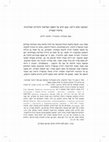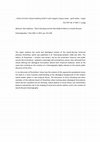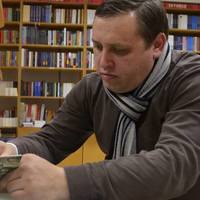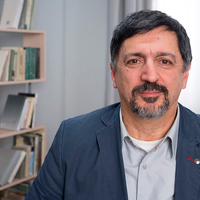Books by Alex Valdman

Problems of Discipline: Secondary Education, Activism, and the Origins of the Jewish Intelligentsia in the Russian Empire, Jerusalem: Magnes, 2023, 2023
בתי הספר התיכוניים באימפריה הרוסית היו במבט ראשון מוסדות משעממים להחריד: מסדרונות ארוכים ואפלוליי... more בתי הספר התיכוניים באימפריה הרוסית היו במבט ראשון מוסדות משעממים להחריד: מסדרונות ארוכים ואפלוליים, משמעת נוקשה; שינון אינסופי של משוואות ומשפטים ביוונית ובלטינית. אבל מתחת לפני השטח, מאחורי גבם של המחנכים חמורי הסבר, שקקו חיי חברה פעילים: חבורות וחברויות, חוגי קריאה וקופות לעזרה הדדית, עיתונים בכתב יד שהביעו רעיונות ביקורתיים ולעגו למורים, ולפעמים אפילו חוגים מהפכניים נלהבים. שלא ברצונם של אנשי הממסד החינוכי האימפריאלי נעשו בתי הספר התיכוניים לסביבה שאפשר לגלות בה עולמות חדשים ולהשתנות מן הקצה אל הקצה.
במחצית השנייה של המאה התשע-עשרה באו בשערי בתי הספר גם תלמידים יהודים רבים. הגימנזיסטים מספר את סיפורם של תלמידים אלה: מקבלת ההחלטה ללמוד בבית ספר תיכון, דרך אתגרי הקבלה ללימודים וההתמדה בלמידה וכלה בהשפעותיו המעצבות של בית הספר, שרבים מבוגריו היו לאקטיביסטים יהודים, אנשי האינטליגנציה היהודית-רוסית. כך עוסק הגימנזיסטים בנושא שחשיבותו חורגת מדל"ת האמות של בתי הספר: הוא מראה כיצד ההשתלבות במערכות האימפריה, שהרחיקה לכאורה את הצעירים מהחברה היהודית, סללה בפועל נתיבות חדשים לאקטיביזם יהודי.
“Problems of Discipline” explores the social and cultural function of the state system of secondary education in the Russian empire’s north-western provinces in the second half of the nineteenth century. It shows how schools facilitated socialization into informal, yet non-radical forms of political and social activism, and demonstrates, furthermore, how ideas of civil activism and communal commitment, typical to the contemporary Russian critical public discourse, led to the creation of a distinctive Jewish student subculture which contributed, subsequently, to the emergence of a new socially committed Jewish-Russian elite. Thus “Problems of Discipline” suggests a new conceptualization of the emergence of local – Jewish and other – elites and, in a broader view, a new understanding of the modes of Russian imperial socialization.
Papers by Alex Valdman

ציון, 2024
Natkovich, Valdman, "The Colony that Never Happened: A New Outlook on the Emergence of Modern Jew... more Natkovich, Valdman, "The Colony that Never Happened: A New Outlook on the Emergence of Modern Jewish Elites in Tsarist Russia," Zion 89, 2, 2024, pp. 173-198. For an abstract in English see the English Abstracts section below.
במרוצת המאה התשע-עשרה הופיעו בקרב יהודי האימפריה הרוסית קבוצות של פעילי ציבור חדשים, שלא נמנו עם העילית הלמדנית או הכלכלית המסורתית, ואף לא השתייכו לתנועת ההשכלה היהודית. הראייה המחקרית הקיימת נוטה לקשור את הופעתן של קבוצות אלה עם התפתחויות שהתרחשו החל משלהי שנות החמישים של המאה התשע-עשרה: מגמות אידיאולוגיות ודוריות בקרב בתנועת ההשכלה, ושינויי המשטר והמדיניות בשנות מלוכתו הראשונות של אלכסנדר השני. המאמר הנוכחי מציע זווית ראייה אחרת על המקורות החברתיים והרעיוניים של קבוצות פעילי הציבור החדשים, ועל ההקשר הגיאוגרפי והכרונולוגי שבו התגבשו לראשונה. במוקד הדיון עומדת הצעה להקמת מושבה חקלאית יהודית שגובשה בשנת 1840 על ידי קבוצה של צעירים יהודים. המאמר בוחן את הנסיבות החברתיות והמקורות האידיאולוגיים של הצעה זו בהתבסס על תיעוד ארכיוני מקיף מארכיוני אוקראינה ורוסיה. בחינה זו מלמדת על כך שכבר בשנות השלושים והארבעים של המאה התשע-עשרה נוצרו בתחום המושב – ובייחוד באגפיו הדרומיים, קרי בדרום-מזרח אוקראינה של היום – חוגים מצומצמים של אליטה יהודית-רוסית עצמאית ואקטיביסטית. עם מקורות החניכה של צעירים אלה נמנו המרצים והסטודנטים באוניברסיטה האימפריאלית בחרקיב, וגורמים אחרים מחוץ לחברה היהודית. בדומה לעמיתיהם מקרב קבוצות אתניות-דתיות אחרות – דוגמת האוקראינים או הרוסים – הושפעו הצעירים היהודים מאפשרויות הקידום והניעות שהציעה המסגרת האימפריאלית, ובה בעת אך גיבשו תפיסה הרואה בבני עמם ציבור בעל צרכים תרבותיים, כלכליים ופוליטיים מובחנים. נחשף כאן אפוא מהלך דיאלקטי מובהק, שבו זיקה מקומית-פרטיקולרית מובהקת כרוכה במערכות ההמשגה הרעיונית והניעות החברתית של האימפריה.

The Russian Review, 2023
In spring 1879, news reached the Russian Ministry of Education that students from several Real Sc... more In spring 1879, news reached the Russian Ministry of Education that students from several Real Schools in the Russian Empire's western provinces were planning to send a coordinated petition to the Minister of Education, asking for permission to enroll in university. The petition initiative was arranged in secrecy and involved more than a dozen schools from Odessa in the south to St. Petersburg in the north. Drawing on materials from several archives, this article traces the evolution of the petition initiative and addresses three main questions. First, the article demonstrates that the petition initiative was understood by students and officials alike as a severe breach of school discipline, but not a political crime, and it explains how and why the initiative is representative of the limited yet distinctive space of legitimation created by the authorities for non-radical student activism. Second, it contextualizes the petition initiative against the backdrop of the discussion on civil activism in Russia, highlighting how secondary students were influenced and inspired by the contemporary public discourse and the idea of public activism. Finally, the article analyzes the internal social mechanisms of the petition initiative, demonstrating how it combined local self-organization with imperial networking, mobility, and imagination. Eighteen seventy-nine was a challenging year for the imperial Russian government. The Balkan war ended with the Treaty of Berlin, a settlement that exposed the limits of Russia's international influence and prompted domestic criticism and dissatisfaction. Furthermore, the authorities had to contend with the emergence of a revolutionary underground and a spate of assaults against senior officials. After several attacks during 1878, February 1879 saw the assassination of Kharkov Governor Dmitry Kropotkin, followed by attempts on Alexander II's life in April and November. Secondary schools and universities were regarded as venues of radical agitation and dissent, and the authorities kept a watchful eye on them for any signs of unrest or prohibited student activism.
"Israelis and Soviet Jews, 1953-1967: Towards a Dialogic Analysis." See English abstract below, 2020
Simon Dubnow Institute Yearbook, 2017
Jewish Social Studies, 2019
East European Jewish Affairs, 2017
Alex Valdman, "Jewish acculturation in late nineteenth-century Russia: the case of Yonah Berkhin,... more Alex Valdman, "Jewish acculturation in late nineteenth-century Russia: the case of Yonah Berkhin," East European Jewish Affairs, 47, 1 (2017), 28-44.
"Sha'ul Ginsburg and the Non-Radical Pattern in Jewish-Russian Historiography;" See English abstract below.
English abstracts for non-English publications by Alex Valdman

Alex Valdman, " Sha'ul Ginsburg and the Non-Radical Pattern in Jewish-Russian Historiography, " Z... more Alex Valdman, " Sha'ul Ginsburg and the Non-Radical Pattern in Jewish-Russian Historiography, " Zion LXXX, 4, 2015, pp. 521-549. This paper explores the social and ideological context of the Jewish-Russian historical almanac Perezhitoe, which was published in St. Petersburg between 1908 and 1913. The editors of Perezhitoe – scholars and writers, led by the prominent historian and public activist Sha'ul Ginsburg – adopted a seemingly self-contradictory stance: they refrained from clearly defining the ideological formulation behind their historical endeavor, while at the same time insisting on the creation of a historiography highly relevant to the Jewish public discourse of the time. In my discussion of Perezhitoe I show how the analysis of this apparently paradoxical stance can lead to a more nuanced understanding of the ideological backgrounds of the modern Jewish public sphere in late Imperial Russia. The discussion of Sha'ul Ginsburg and other members of the editorial board of Perezhitoe allow tracking down ideological formulations which did not crystallize into far-reaching, radical political or social visions, but nevertheless played a noteworthy role in the shaping of social and cultural realities, and in the creation of Jewish-Russian historiography.
Thesis Chapters by Alex Valdman
Book Reviews by Alex Valdman
East European Jewish Affairs 51, 2021
Judaic-Slavic Journal № 1 (2), 2019
על "ממהפכה למלחמה" מאת ולדימיר לוין ועל "אנו היינו הראשונים" מאת יוסי גולדשטיין
Other Texts / Public History by Alex Valdman











Uploads
Books by Alex Valdman
במחצית השנייה של המאה התשע-עשרה באו בשערי בתי הספר גם תלמידים יהודים רבים. הגימנזיסטים מספר את סיפורם של תלמידים אלה: מקבלת ההחלטה ללמוד בבית ספר תיכון, דרך אתגרי הקבלה ללימודים וההתמדה בלמידה וכלה בהשפעותיו המעצבות של בית הספר, שרבים מבוגריו היו לאקטיביסטים יהודים, אנשי האינטליגנציה היהודית-רוסית. כך עוסק הגימנזיסטים בנושא שחשיבותו חורגת מדל"ת האמות של בתי הספר: הוא מראה כיצד ההשתלבות במערכות האימפריה, שהרחיקה לכאורה את הצעירים מהחברה היהודית, סללה בפועל נתיבות חדשים לאקטיביזם יהודי.
“Problems of Discipline” explores the social and cultural function of the state system of secondary education in the Russian empire’s north-western provinces in the second half of the nineteenth century. It shows how schools facilitated socialization into informal, yet non-radical forms of political and social activism, and demonstrates, furthermore, how ideas of civil activism and communal commitment, typical to the contemporary Russian critical public discourse, led to the creation of a distinctive Jewish student subculture which contributed, subsequently, to the emergence of a new socially committed Jewish-Russian elite. Thus “Problems of Discipline” suggests a new conceptualization of the emergence of local – Jewish and other – elites and, in a broader view, a new understanding of the modes of Russian imperial socialization.
Papers by Alex Valdman
במרוצת המאה התשע-עשרה הופיעו בקרב יהודי האימפריה הרוסית קבוצות של פעילי ציבור חדשים, שלא נמנו עם העילית הלמדנית או הכלכלית המסורתית, ואף לא השתייכו לתנועת ההשכלה היהודית. הראייה המחקרית הקיימת נוטה לקשור את הופעתן של קבוצות אלה עם התפתחויות שהתרחשו החל משלהי שנות החמישים של המאה התשע-עשרה: מגמות אידיאולוגיות ודוריות בקרב בתנועת ההשכלה, ושינויי המשטר והמדיניות בשנות מלוכתו הראשונות של אלכסנדר השני. המאמר הנוכחי מציע זווית ראייה אחרת על המקורות החברתיים והרעיוניים של קבוצות פעילי הציבור החדשים, ועל ההקשר הגיאוגרפי והכרונולוגי שבו התגבשו לראשונה. במוקד הדיון עומדת הצעה להקמת מושבה חקלאית יהודית שגובשה בשנת 1840 על ידי קבוצה של צעירים יהודים. המאמר בוחן את הנסיבות החברתיות והמקורות האידיאולוגיים של הצעה זו בהתבסס על תיעוד ארכיוני מקיף מארכיוני אוקראינה ורוסיה. בחינה זו מלמדת על כך שכבר בשנות השלושים והארבעים של המאה התשע-עשרה נוצרו בתחום המושב – ובייחוד באגפיו הדרומיים, קרי בדרום-מזרח אוקראינה של היום – חוגים מצומצמים של אליטה יהודית-רוסית עצמאית ואקטיביסטית. עם מקורות החניכה של צעירים אלה נמנו המרצים והסטודנטים באוניברסיטה האימפריאלית בחרקיב, וגורמים אחרים מחוץ לחברה היהודית. בדומה לעמיתיהם מקרב קבוצות אתניות-דתיות אחרות – דוגמת האוקראינים או הרוסים – הושפעו הצעירים היהודים מאפשרויות הקידום והניעות שהציעה המסגרת האימפריאלית, ובה בעת אך גיבשו תפיסה הרואה בבני עמם ציבור בעל צרכים תרבותיים, כלכליים ופוליטיים מובחנים. נחשף כאן אפוא מהלך דיאלקטי מובהק, שבו זיקה מקומית-פרטיקולרית מובהקת כרוכה במערכות ההמשגה הרעיונית והניעות החברתית של האימפריה.
English abstracts for non-English publications by Alex Valdman
Thesis Chapters by Alex Valdman
Book Reviews by Alex Valdman
Other Texts / Public History by Alex Valdman
במחצית השנייה של המאה התשע-עשרה באו בשערי בתי הספר גם תלמידים יהודים רבים. הגימנזיסטים מספר את סיפורם של תלמידים אלה: מקבלת ההחלטה ללמוד בבית ספר תיכון, דרך אתגרי הקבלה ללימודים וההתמדה בלמידה וכלה בהשפעותיו המעצבות של בית הספר, שרבים מבוגריו היו לאקטיביסטים יהודים, אנשי האינטליגנציה היהודית-רוסית. כך עוסק הגימנזיסטים בנושא שחשיבותו חורגת מדל"ת האמות של בתי הספר: הוא מראה כיצד ההשתלבות במערכות האימפריה, שהרחיקה לכאורה את הצעירים מהחברה היהודית, סללה בפועל נתיבות חדשים לאקטיביזם יהודי.
“Problems of Discipline” explores the social and cultural function of the state system of secondary education in the Russian empire’s north-western provinces in the second half of the nineteenth century. It shows how schools facilitated socialization into informal, yet non-radical forms of political and social activism, and demonstrates, furthermore, how ideas of civil activism and communal commitment, typical to the contemporary Russian critical public discourse, led to the creation of a distinctive Jewish student subculture which contributed, subsequently, to the emergence of a new socially committed Jewish-Russian elite. Thus “Problems of Discipline” suggests a new conceptualization of the emergence of local – Jewish and other – elites and, in a broader view, a new understanding of the modes of Russian imperial socialization.
במרוצת המאה התשע-עשרה הופיעו בקרב יהודי האימפריה הרוסית קבוצות של פעילי ציבור חדשים, שלא נמנו עם העילית הלמדנית או הכלכלית המסורתית, ואף לא השתייכו לתנועת ההשכלה היהודית. הראייה המחקרית הקיימת נוטה לקשור את הופעתן של קבוצות אלה עם התפתחויות שהתרחשו החל משלהי שנות החמישים של המאה התשע-עשרה: מגמות אידיאולוגיות ודוריות בקרב בתנועת ההשכלה, ושינויי המשטר והמדיניות בשנות מלוכתו הראשונות של אלכסנדר השני. המאמר הנוכחי מציע זווית ראייה אחרת על המקורות החברתיים והרעיוניים של קבוצות פעילי הציבור החדשים, ועל ההקשר הגיאוגרפי והכרונולוגי שבו התגבשו לראשונה. במוקד הדיון עומדת הצעה להקמת מושבה חקלאית יהודית שגובשה בשנת 1840 על ידי קבוצה של צעירים יהודים. המאמר בוחן את הנסיבות החברתיות והמקורות האידיאולוגיים של הצעה זו בהתבסס על תיעוד ארכיוני מקיף מארכיוני אוקראינה ורוסיה. בחינה זו מלמדת על כך שכבר בשנות השלושים והארבעים של המאה התשע-עשרה נוצרו בתחום המושב – ובייחוד באגפיו הדרומיים, קרי בדרום-מזרח אוקראינה של היום – חוגים מצומצמים של אליטה יהודית-רוסית עצמאית ואקטיביסטית. עם מקורות החניכה של צעירים אלה נמנו המרצים והסטודנטים באוניברסיטה האימפריאלית בחרקיב, וגורמים אחרים מחוץ לחברה היהודית. בדומה לעמיתיהם מקרב קבוצות אתניות-דתיות אחרות – דוגמת האוקראינים או הרוסים – הושפעו הצעירים היהודים מאפשרויות הקידום והניעות שהציעה המסגרת האימפריאלית, ובה בעת אך גיבשו תפיסה הרואה בבני עמם ציבור בעל צרכים תרבותיים, כלכליים ופוליטיים מובחנים. נחשף כאן אפוא מהלך דיאלקטי מובהק, שבו זיקה מקומית-פרטיקולרית מובהקת כרוכה במערכות ההמשגה הרעיונית והניעות החברתית של האימפריה.
https://huji.zoom.us/j/86702115258?pwd=M0RpbmIzeGV6Y3ZIYnB0bjlvWk1hZz09
https://sefer.ru//rus/education/educational_programmes/Winter/winter20.php